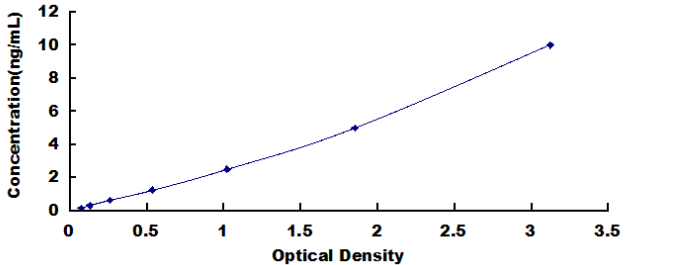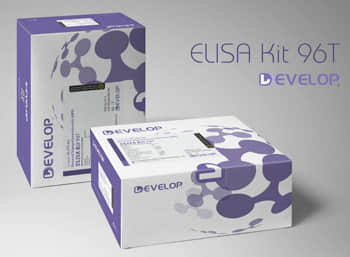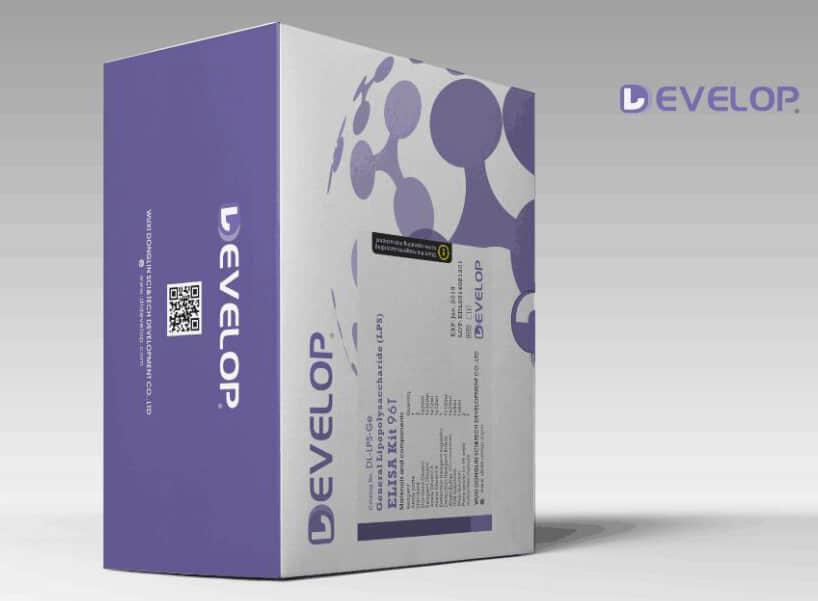Rat A Disintegrin And Metalloproteinase With Thrombospondin 7 (ADAMTS7) ELISA Kit


two product lines: Traditional ELISA Kit and Ready-to-Use ELISA Kit.


Other names:COMPase
Function: Metalloprotease that may play a role in the degradation of COMP.
Sequence:
MHRGLNLLLI LCALAPHVLG PASGLPTEGR AGLDIVHPVR VDAGGSFLSY
ELWPRVLRKR DVSAAQASSA FYQLQYQGRE LLFNLTTNPY LLAPGFVSEI
RRRSNLSNVH IQTSVPTCHL LGDVQDPELE GGFAAISACD GLRGVFQLSN
EDYFIEPLDE VPAQPGHAQP HMVYKHKRSG QQDDSRTSGT CGVQGSPELK
HQREHWEQRQ QKRRQQRSIS KEKWVETLVV ADSKMVEYHG QPQVESYVLT
IMNMVAGLYH DPSIGNPIHI TVVRLIILED EEKDLKITHH ADDTLKNFCR
WQKNVNMKGD DHPQHHDTAI LLTRKDLCAT MNHPCETLGL SHVAGLCHPQ
LSCSVSEDTG LPLAFTVAHE LGHSFGIQHD GTGNDCESIG KRPFIMSPQL
LYDRGIPLTW SRCSREYITR FLDRGWGLCL DDRPSKGVIN FPSVLPGVLY
DVNHQCRLQY GPSSAYCEDV DNVCYTLWCS VGTTCHSKMD AAVDGTSCGK
NKWCLNGECV PEGFQPETVD GGWSGWSAWS VCSRSCGVGV RSSERQCTQP
VPKNKGKYCV GERKRYRLCN LQACPPDRPS FRHTQCSQFD SMLYKGKLHK
WVPVLNDENP CELHCRPFNY SNREKLRDAV MDGTPCYQGR ISRDICIDGI
CKKVGCDFEL DSGAEEDRCG VCRGDGSTCH TVSRTFKEAE GMGYVDVGLI
PAGAREILIE EVAEAANFLA LRSEDPDKYF LNGGWTIQWN GDYQVAGTTF
TYTRKGNWET LTSPGPTTEP VWIQLLFQER NPGVHYKYTI QRASHSEAQP
PEFSWHYGPW SKCPVTCGTG VQRQSLYCME KQAGIVDEGH CDHLSRPRDR
KRKCNEEPCP ARWWVGDWQP CSRSCGPGGF FRRAVFCTRS VGLDEQRALE
PSACGHLPRP LAEIPCYHYV ACPSSWGVGN WSQCSVTCGA GIRQRSVLCI
NNTGVPCDGA ERPITETFCF LQPCQYSTYI VDTGASGSGS SSPELFNEVD
FDPHQPVPRP SPASSPKPVS ISNAIDEEDP ELDPPGPVFV DDFYYDYNFI
NFHEDLSYGS FEESHSDLVD IGGQTVPPHI RPTEPPSDSP VPTAGAPGAE
EEGIQGSWSP SPLLSEASHS PPVLLENTPV NPLANFLTEE ESPIGAPELG
LPSVSWPPAS VDGMVTSVAP GNPDELLVRE DTQSQPSTPW SDRNKLSKDG
NPLGPTSPAL PKSPFPTQPS SPSNSTTQAS LSPDAVEVST GWNVALDPVL
EADLKPVHAP TDPGLLDQIQ TPHTEGTQSP GLLPRPAQET QTNSSKDPAV
QPLQPSLVED GAPTDLLPAK NASWQVGNWS QCSTTCGLGA IWRLVRCSSG
NDEDCTLSSR PQPARHCHLR PCAAWRAGNW SKCSRNCGGG SATRDVQCVD
TRDLRPLRPF HCQPGPTKPP TRQLCGTQPC LPWYTSSWRE CSEACGGGEQ
QRLVTCPEPG LCEESLRPNN TRPCNTHPCT QWVVGPWGQC SAPCGGGVQR
RLVKCVNTQT GLAEEDSDLC SHEAWPESSR PCATEDCELV EPSRCERDRL
PFNFCETLRL LGRCQLPTIR AQCCRSCPPL SRGVPSRGHQ RVARR
2. Features
INTENDED USE
The kit is a sandwich enzyme immunoassay for the in vitro quantitative measurement of ADAMTS7 in rat tissue homogenates, cell lysates and other biological fluids.
DETECTION RANGE
0.156-10ng/mL. The standard curve concentrations used for the ELISA’s were 10ng/mL, 5ng/mL, 2.5ng/mL, 1.25ng/mL, 0.625ng/mL, 0.312ng/mL, 0.156ng/mL.
SENSITIVITY
The minimum detectable dose of ADAMTS7 is typically less than 0.058ng/mL.
The sensitivity of this assay, or Lower Limit of Detection (LLD) was defined as the lowest protein concentration that could be differentiated from zero. It was determined by adding two standard deviations to the mean optical density value of twenty zero standard replicates and calculating the corresponding concentration.
SPECIFICITY
This assay has high sensitivity and excellent specificity for detection of ADAMTS7.
No significant cross-reactivity or interference between ADAMTS7 and analogues was observed.
Note: Limited by current skills and knowledge, it is impossible to perform all possible cross-reactivity detection tests between ADAMTS7 and all analogues, therefore, cross reactivity may still exist.
IMPORTANT NOTES
1. Limited by the current conditions and scientific technology, it is impossible to conduct comprehensive identification and analysis tests on the raw materials provided by suppliers. As a result, it is possible there are some qualitative and/or technical risks.
2. The final experimental results will be closely related to the validity of the products, operation skills of the end users and the experimental environments. Please make sure that sufficient samples are available to obtain accurate results.
3. Kits from different batches may be a little different in detection range, sensitivity and color developing time. Please perform the experiment exactly according to the instruction manual included in your kit. Electronic ones on our website are for reference only.
4. Do not mix or substitute reagents from one kit lot to another. Use only the reagents supplied by manufacturer.
5. Protect all reagents from strong light during storage and incubation. All bottle caps of reagents should be closed tightly to prevent evaporation of liquids and contamination by microorganisms.
6. There may be a foggy substance in the wells when the plate is opened at the first time. It will not have any effect on the final assay results. Do not remove microtiter plate from the storage bag until needed.
7. Incorrect procedures during reagent preparation and loading, as well as incorrect parameter setting for the plate reader may lead to incorrect results. A microplate plate reader with a bandwidth of 10nm or less and an optical density range of 0-3 O.D. or greater at 450 ± 10nm wavelength is acceptable for use in absorbance measurement. Please read the instruction carefully and adjust the instrument prior to the experiment.
8. Even the same experimenter may get different results from two separate experiments. In order to get better reproducible results, the operation of every step in the assay should be controlled. Furthermore, a preliminary experiment before the general assay for each batch is recommended.
9. Each kit has undergone several rigorous quality control tests. However, results from end users might be inconsistent with our in-house data due to some unexpected transportation conditions or different lab equipment. Intra-assay variance among kits from different batches could arise from the above factors as well.
10. Kits from different manufacturers with the same item might produce different results, since we have not compared our products with other manufacturers.
11. The standard in this kit, as well as the antigens used in antibody preparation are typically recombinant proteins. Differently expressed sequences, expression systems, and/or purification methods can be used in the preparation of recombinant proteins. There is also the possibility of differences in the screening technique of antibodies and antibody pairs in our kits. As a result, we cannot guarantee that our kit will be able to detect recombinant proteins produced by other companies. We do NOT recommend using our ELISA kits for the detection of other recombinant proteins.
12. Validity period: 12 months.
13. The instruction manual also works with the 48T kit, but all reagents in the 48T kit are reduced by half.
PRECAUTION
The Stop Solution suggested for use with this kit is an acid solution. Wear
eye, hand, face, and clothing protection when using this reagent.
You can reference link of the kit as following
https://www.dldevelop.com/uploadfile/data/DL-ADAMTS7-Hu.pdf
https://dldevelop.com/Research-reagent/dl-adamts7-ra.html
https://www.dldevelop.com/uploadfile/data/DL-ADAMTS7-Ra.pdf
Introduction
| Item | Standard | Test | |
| Description |
The kit is a sandwich enzyme immunoassay for the in vitro quantitative measurement of ADAMTS7 in rat tissue homogenates, cell lysates or other biological fluids. |
Conform | |
| Identification | Colorimetric | Positive | |
| Composition | Traditional ELISA Kit | Ready-to-Use ELISA KIT | Conform |
| Pre-coated, ready to use 96-well strip plate 1 | Pre-coated, ready to use 96-well strip plate 1 | ||
| Plate sealer for 96 wells 2 | Plate sealer for 96 wells 2 | ||
| Standard 2 | Standard 2 | ||
| Diluents buffer 1×45mL | Standard Diluent 1×20mL | ||
| Detection Reagent A 1×120μL | Detection Solution A 1×12mL | ||
| Detection Reagent B 1×120μL | Detection Solution B 1×12mL | ||
| TMB Substrate 1×9mL | TMB Substrate 1×9mL | ||
| Stop Solution 1×6mL | Stop Solution 1×6mL | ||
| Wash Buffer (30 × concentrate) 1×20mL | Wash Buffer (30 × concentrate) 1×20mL | ||
| Instruction manual 1 | Instruction manual 1 | ||
Test principle
The microtiter plate provided in this kit has been pre-coated with an antibody specific to the index. Standards or samples are then added to the appropriate microtiter plate wells with a biotin-conjugated antibody preparation specific to the index. Next, Avidin conjugated to Horseradish Peroxidase (HRP) is added to each microplate well and incubated. After TMB substrate solution is added, only those wells that contain the index, biotin-conjugated antibody and enzyme-conjugated Avidin will exhibit a change in color. The enzyme-substrate reaction is terminated by the addition of sulphuric acid solution and the color change is measured spectrophotometrically at a wavelength of 450nm ± 10nm. The concentration of the index in the samples is then determined by comparing the O.D. of the samples to the standard curve.
Recovery
Matrices listed below were spiked with certain level of recombinant ADAMTS7 and the recovery rates were calculated by comparing the measured value to the expected amount of the index in samples.
| Matrix | Recovery range (%) | Average(%) |
| serum(n=5) | 81-93 | 86 |
| EDTA plasma(n=5) | 80-97 | 88 |
| heparin plasma(n=5) | 90-101 | 95 |
Linearity
The linearity of the kit was assayed by testing samples spiked with appropriate concentration of the index and their serial dilutions. The results were demonstrated by the percentage of calculated concentration to the expected.
| Sample | 1:2 | 1:4 | 1:8 | 1:16 |
| serum(n=5) | 82-96% | 83-98% | 81-99% | 93-101% |
| EDTA plasma(n=5) | 88-101% | 86-95% | 90-102% | 80-93% |
| heparin plasma(n=5) | 80-91% | 82-90% | 95-104% | 79-95% |
Precision
Intra-assay Precision (Precision within an assay): 3 samples with low, middle and high level the index were tested 20 times on one plate, respectively.
Inter-assay Precision (Precision between assays): 3 samples with low, middle and high level the index were tested on 3 different plates, 8 replicates in each plate.
CV(%) = SD/meanX100
Intra-Assay: CV<10%
Inter-Assay: CV<12%
Stability
The stability of ELISA kit is determined by the loss rate of activity. The loss rate of this kit is less than 5% within the expiration date under appropriate storage conditions.
Note:
To minimize unnecessary influences on the performance, operation procedures and lab conditions, especially room temperature, air humidity and incubator temperatures should be strictly regulated. It is also strongly suggested that the whole assay is performed by the same experimenter from the beginning to the end.
Assay procedure summary
1. Prepare all reagents, samples and standards;
2. Add 100µL standard or sample to each well. Incubate 2 hours at 37℃;
3. Aspirate and add 100µL prepared Detection Reagent A. Incubate 1 hour at 37℃;
4. Aspirate and wash 3 times;
5. Add 100µL prepared Detection Reagent B. Incubate 1 hour at 37℃;
6. Aspirate and wash 5 times;
7. Add 90µL Substrate Solution. Incubate 15-25 minutes at 37℃;
8. Add 50µL Stop Solution. Read at 450nm immediately.
Order or get a Quote
We will reply you within 24 hours!














